Welcome back to the Supporting Actress Smackdown. Each month we pick an Oscar vintage to explore through the lens of actressing at the edges. This episode goes back to the 19th Academy Awards honoring 1946. It isn't a particularly beloved Oscar vintage though the Best Picture winner, The Best Years of Our Lives, is sublime. Apart from the winner and the Christmas film It's a Wonderful Life, the Academy all but ignored the most enduring pictures of that post-war year (Notorious, Gilda, The Postman Always Rings Twice). But we're here to discuss Best Supporting Actress and these five women were having a moment...
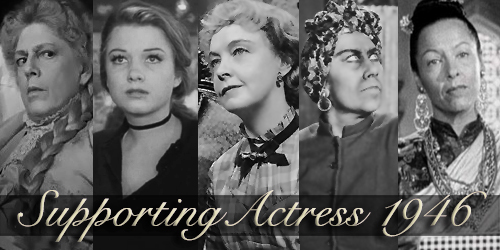

THE NOMINEES For the 1946 Oscars the Academy invited back two previous winners (Gale Sondergaard & Ethel Barrymore), tossed a bouquet in the form of 'career' nomination to a legend (Lillian Gish), honored a character actress for stretching (Flora Robson) without realizing how poorly that kind of stretch would age, and invited a new starlet (Anne Baxter) into the club. That's a typical mix in some ways though the films were a fun mix of genres rather than five straightforward dramas. We've got a culture clash historical epic (Anna and the King of Siam), a thriller (The Spiral Staircase), a camp western (Duel in the Sun), a post-war spiritual journey (The Razor's Edge), and a restless genre-hopping whatsit (Saratoga Trunk).
THE PANELISTS Here to talk about the performances and films are (alpha order from left to right), playwright Peter Duchan, film critic Guy Lodge, Statueseque's Allen Nguyen, and Actor Tory Devon Smith. And, as ever, your host Nathaniel R. Let's begin...
SUPPORTING ACTRESS SMACKDOWN + PODCAST
The companion podcast can be downloaded at the bottom of this article or by visiting the iTunes page...
ETHEL BARRYMORE as "Mrs Warren" in The Spiral Staircase
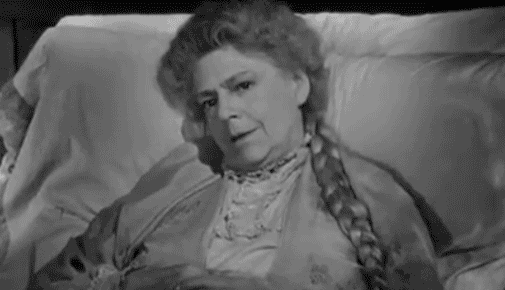
Synopsis: A dying proud widow, living with her two sons in a huge spooky house, fears for the safety of her mute servant girl after other disabled girls are murdered in town.
Stats: 67 yrs old, 17th film, third billed. Second nomination (of an eventual four). 13 minutes of screen time (or 15% of the running time)
Peter Duchan: She clearly understands the (narrow) assignment, making the most of a seriously limited role. Barrymore conveys a sense of knowing what we expect the role to be—imperious invalid who is kind underneath—and offers moments of mischievous subversion to keep our attention. I wish her final act hadn’t been so easy to foresee (who else could have had possession of the missing gun?) but her campy line reading—“Murderer!”—had me in stitches. ♥♥♥
Guy Lodge: Unlike in Robert Siodmak's other, better 1946 noir The Killers, the second-tier cast here is largely overwhelmed by the film's directorial expressionism: the actors are effectively the necessary negatives to all those exquisite shadows. So it's to Barrymore's credit that her own star persona emerges from all that styling: that peppery grande-dame wiliness livens up her handful of scenes even from a position of bedridden stasis, and her hawkish, quizzical gaze pays off when she's asked to carry off a precarious last-minute twist. It's harder to credit the performance with any particular degree of difficulty: it's the kind of gilding-the-lily nomination that the Academy habitually and pointlessly tosses to people who've recently won. ♥♥
Allen Nguyen: Mrs. Warren may not strike as particularly remarkable at first blush, but one comes to realize that Barrymore’s performance is a slow burn bloom. She serves as The Spiral Staircase’s recounter, complementing the film’s sinister atmosphere with a foreboding intensity while supplying us with all the context we need as we hurtle toward a rousing climax. It isn’t until the very end (and what an end it is!), as you take in the twisted depths of those within her orbit, are you appreciative of how fascinating and enigmatic she really is. ♥♥♥
Tory Devon Smith: Seeing that this was my first time experiencing the legendary Ethel Barrymore on film, I found Barrymore’s eyes to be the biggest takeaway from her performance here as Mrs. Warren. They express such wit, humor, and anxiety of a person on the verge of death. As she lays there, an oracle of doom, bed-ridden, she’s the cause for much concern within the house as she traumatizes our mute protagonist with good intentions to save her. The film is a slow burn, relying heavily on slasher atmosphere (the film being an early predecessor of the genre) rather than performance. Barrymore, along with Dorothy McGuire as the mute Helen, make the most of their time on screen. I particularly enjoyed Barrymore’s delivery of her final and heroic moment: BANG! Mrs. Warren shoots her gun and yells dryly, “MURDERER!” It’s a “memeable” moment that I couldn’t help but laugh at with glee. ♥♥♥
Nathaniel R: It will never not be funny that half of Barrymore's nearly consecutive nominations come from characters that lie in their death beds bossing people around and side-eyeing the naive young leading lady (see also: Pinky). That said, she's quite good at that very specific typecasting. The revered actress has mischievous fun within the (unchallenging) part. She highlights the ickily contradictory part -- equating violence with strength but being horrified by murders -- but that's as close as she comes to a point of view on the character. I consider this an almost but not quite performance. A good final scene, though, because the character surprises yet still reads like the exact same person in an altered context. ♥♥♥
Reader Write-Ins: "Is she a mystic, or acrazy old woman? Barrymore keeps the mystery confined to her eyes and does so much with so little." - Ben (Reader average: ♥♥♥)
Actress earns 17 ❤s
ANNE BAXTER as "Sophie MacDonald" in The Razor's Edge
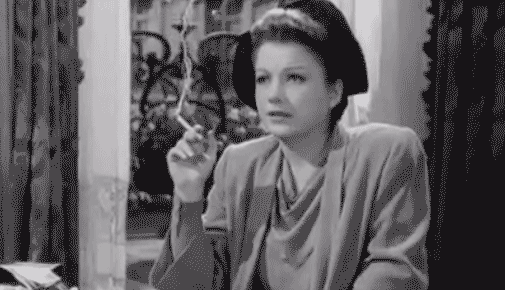
Synopsis: A sweet girl's life turns to tragedy when her husband and child die. She turns to the bottle for oblivion thereafter.
Stats: 23 yrs old, 17th film, 4th billed. First nomination (of an eventual two). 25½ minutes of screentime (or 18% of the running time)
Peter Duchan: This feels like the transparently ambitious Oscar-craving performance in the bunch—or maybe I’m unfairly conflating Anne Baxter and Eve Harrington. A performance that wants to be described as “rangy” but, to me, ultimately feels erratic and disjointed. Each time she reenters the film, she seems to be a totally different person, each with her own distinct physicality and mannerisms, oh the mannerisms. ♥♥♥
Guy Lodge: Baxter's role in this stuffed-shirt prestige drama of Society and Morality and Themes Writ Large is structurally unusual. Although a secondary presence throughout — no category fraud in this fivesome, which is one thing to be unequivocally celebrated about it — hers is the one character required to change over the film's languid 10-year timeframe, explicitly to underline the fixed virtues and failings of the principals. It's an assignment at once showy and strangely thankless, and she doubtless won for her emotionally extravagant, somewhat overegged peaks of grief and alcoholism. But it's when her feelings are turned inward, trying and failing to contain weaknesses and wounds, that the performance is most moving — her face at an on-the-wagon Ritz lunch is a remarkable picture of well-mannered but fit-to-burst torment. ♥♥♥♥
Allen Nguyen: From breathless and lovestruck girl to bereaved widow and mother to alcoholic and woman of “evil reputation,” Sophie is a loaded enough part such that she may as well have her own dedicated film. It’s the kind of role that’s a no-brainer for an Oscar because it demands so much drama from its actress and so much sympathy from the viewer. Tyrone Power may be our compassionate hero, but Baxter gives The Razor’s Edge earnestness -- she permeates deeply felt grief and (mostly) avoids theatrics, even as each successive tier of Sophie’s tragic descent invites more ham. The film would be a load of hot air without her. ♥♥♥♥
Tory Devon Smith: Mere minutes into The Razor’s Edge, Anne Baxter whisks onto the screen like a warm breeze in springtime. Baxter infuses Sophie MacDonald with an adolescent charm within those first few minutes, an innocent young woman, happily in love with her entire future ahead of her. Nearly half-way through the film, Sophie’s predicament changes dramatically as she endures an unspeakable tragedy. At that moment, Sophie, through the sensational Anne Baxter, completely steals the entire film. To witness Sophie’s journey in this movie, to watch her disintegrate into complete hopelessness is tragically divine. You’re riveted by Baxter as she expertly interprets the stages of impossible grief. It’s quite literally a different movie when she’s on the screen. My favorite scene in the entire picture is of Baxter: as our cast of characters celebrates at the Rue de Lappe bar in France, Sophie drunkenly stumbles up courageously to the group. Her hair disheveled, as well as her spirit, she demands a bottle of liquor, and makes incredibly awkward small talk with her once supportive friends, her desperation in full display. It’s a marvelous sequence. The thing that Baxter does so well in this performance is that she keeps a meticulous thread of anguish throughout her portrayal. Once Sophie is hit with that tragedy, Baxter doesn’t let go of that pain, not for a second. It’s as if Sophie experienced electric shock therapy! ♥♥♥♥♥
Nathaniel R: First impression: A innocent if vanilla bland friend of a cooler society type (Gene Tierney) who can't stop talking about her boyfriend. Second impression: Happy married boring mom/wife. Third impression: Shell-shocked and hysteric but who wouldn't be given the offscreen tragedy. Fourth impression: Miserable, hostile, confusing/confused, convincingly headed toward blackout drunk (very strong scene). Fifth impression: Sober and quiet. Very uncomfortable in social settings. In each of these scenes Baxter is fine and there's a certain momentum to the performance but who is this woman? It doesn't quite cohere despite a couple great moments. (I was hoping Anne Baxter would rescue me and she is best in the lineup for sure but I regret to say I wouldn't have nominated a single one of these ladies. I think that's the first time that's happened in a Smackdown!) ♥♥♥
Reader Write-Ins: "From the moment she appears on screen as the timid but ingratiating Sophie until her anguished flight out the hellhole’s door into the mists of the abyss Anne Baxter is incredibly alive and vivid" - Joel6 (Reader average: ♥♥♥♥)
Actress earns 23 ❤s
LILLIAN GISH as "Laura Belle McCanles" in Duel in the Sun
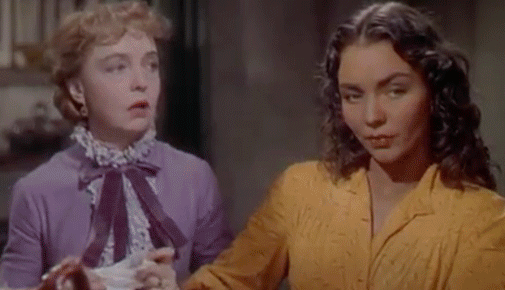
Synopsis: The goodhearted wife of a powerful rancher takes in an orphaned "half-breed" which further divides her continually-at-odds family.
Stats: 53 yrs old, 35th film, sixth billed. First and only nomination. 16 minutes of screen time (or 11% of the running time).
Peter Duchan: I’m honestly surprised Gish, a living legend receiving her first (and only!) nomination, didn’t win this award. She plays a Supporting Actress stock character, a wife so long-suffering that even her death scene is dominated by her husband’s experience of it. She has an extraordinarily expressive face and keen sense of physicality. She projects warmth and a wealth of feeling with or without the benefit of dialogue. Her presence is felt on the edges of the frame throughout, making the role seem bigger than it is. ♥♥♥♥
Guy Lodge: It's one of the tragedies of the Academy Awards that they were founded too late to recognise the standard-bearers of silent cinema performance: decades later, this nomination was their attempt to repay that debt to Gish, and it's not quite (or at least not only) the sentimental sop it seems. She's the primary source of warmth in King Vidor and David O. Selznick's thrillingly ludicrous, simultaneously hot- and cold-blooded attempt to refashion the scale and thrust of Gone With the Wind for the Wild West, but she layers up this potentially boilerplate matriarch figure with rueful internal conflict, filling in the script's gaps with her face as only a silent cinema diva knows how. Her best moments are background ones, flashes of side-eye and anxious moues of concern and occasional glee. ♥♥♥
Allen Nguyen: In a film scorched rotten by high camp and melodrama, Gish’s performance stands out for being the exact opposite. Up against a bench of actors doing their damnedest to seize your attention, Gish often falls to the wayside, her restrained, graceful presence at odds with all the surrounding firepower. Duel in the Sun’s implies that Laura Belle is a more complex creature than meets the eye, yet what we get to see of her is little more than the doting, long-suffering wife archetype. It seems as though the film doesn’t know what to do with Laura Belle, and Gish becomes a nonfactor as a result. ♥♥
Tory Devon Smith: Considered to be The First Lady of American Cinema, Lillian Gish plays Laura Belle McCanles as a docile woman, quant and agreeable. She’s sweet, with a hint of dimwittedness. There’s nothing extraordinary nor too intriguing about Laura as a character, and I believe Gish imbues her with an appropriate amount of compassion. Outside of Laura’s death scene (a scene that I found was primarily sold by her co-star, the great Lionel Barrymore as Senator McCanles) there isn’t much for Gish to do. However, there’s a pivotal scene where Gish’s character stands up to her overbearing husband, and unfortunately, it’s a weak expression of courage performed by Gish. The opportunity was there for Gish to express more depth of emotion, and she didn’t which I found a shame. However, I found her performance a relief in Duel In The Sun, a superfluous and tedious film where Gish’s performance remained grounded within its scope. That’s talent! ♥♥
Nathaniel R: It's a pity that Gish's best work largely pre-dated the Oscars and that they didn't just wait until 1955 to honor her for The Night of the Hunter. Gish plays saintly well, and I actually liked that she didn't overplay the moment she finally stood up to her bully husband but maybe overplay something since the movie begs for it; Every other actor is munching on the juicy scenery throughout. Even Laura Belle's vague fatal illness is sort of gummed at by Gish rather than heartily devoured. There's nothing wrong with her performance in Duel in the Sun, per se, but there's nothing exciting about it either. ♥♥
Reader Write-Ins: "Her silent film training is beautifully on display. Her facial expressions, walk, and that crawl on her deathbed spoke volumes. A serious performance in a sea of camp." - Drew (Reader average: ♥♥½)
Actress earns 15½ ❤s
FLORA ROBSON as "Angelique Buiton" in Saratoga Trunk
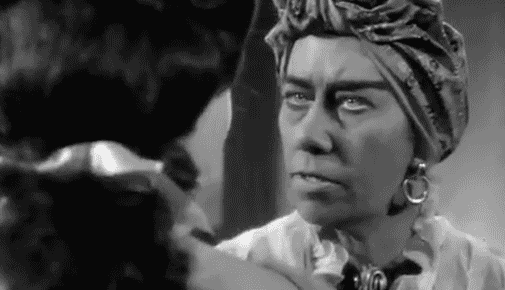
Synopsis: A tetchy but loyal servant, tries in vain to control her willful employer, a scheming illegitimate French girl seeking revenge on her father's high society family.
Stats: 44 yrs old, 15th film, third billed. First (and only) nomination. 41 minutes of screentime (or 30% of the running time.)
Peter Duchan: Oof. I consider Robson a great actress—Black Narcissus! Fire Over England! Freida!—but this was a mistake. Why was she offered this role? (Why wasn’t it given to Ethel Waters or Lena Horne, both rumored to have been in contention?) Why’d she accept it? Despite ample screen time, she makes little to no impression. She has one decent scene (in the kitchen in New Orleans, when she softens towards Gary Cooper) but otherwise we’re given little access to her. Even Florence Bates (as Mrs Bellop) makes more of her handful of moments—but even Bates is given more to do and benefits from the camera lingering on her face. ♥
Guy Lodge: Although other forms of culturally appropriative casting would endure for decades in Hollywood, blackface wasn't the industry's go-to solution by 1946 — which grimly suggests that Robson's nomination, as inexplicable as it is indefensible, was driven to a large extent by novelty. It's hard to know why Warner Bros. elected to bypass any Black actors to play the perma-cranky handmaiden to Ingrid Bergman's Creole (?!?!) heiress, when Ethel Waters and Lena Horne were allegedly among the alternatives considered. At the very least, those actors were spared a lousy role in a lumbering movie, in which Robson is utterly hamstrung: barely able to emote under that Sam Eagle unibrow with which the makeup department has burdened her, with an accent that can slide from North London to New Orleans in a single vowel, it's a performance that fails at the basics, to say nothing of the politics of it all. ♥
Allen Nguyen: That this managed to nab an Oscar nomination is completely inexplicable, not least because I struggle to figure out a single redeemable aspect of Robson’s performance. She appears to have hit autopilot on a single note (that being: “annoyed and/or dissatisfied”) and was otherwise incapable of any other shades of dimension, nor is she able to register any semblance of distinguishable expressiveness or personality. Never mind that she’s painted like a surefire bottom two placement on one of Drag Race’s makeover episodes. ♥
Tory Devon Smith: Flora Robson, masked in beastly and appalling Blackface, imbues Angelique with such limited range, her performance comes off as completely one note: angry, bitter, meddling. The physicality and vocal affectation attempted by Robson are somewhat impressive, but Robson plays Angelique as if she’s a creature, not a human being. Angelique is a woman with deep ties to a family whom she has dedicated her life to, yet there’s no real fragility in her performance to inform the audience of her deep connection to the lineage of that family and the loyalty she demonstrates towards our anti-heroine played by Ingrid Bergman. It’s disturbing showmanship on the part of Robson, and it falls incredibly short because Robson is, quite literally, the WRONG person for this role for the obvious reasons, and in that, Robson, as an actor, could have never succeeded in any real way. Beneath the layers of horrendous Blackface that stifled an actress who was more than capable of crafting an interesting human being named Angelique, we’re unfortunately left with a distracting impression of ethnicity. ♥♥
Nathaniel R: I am a proponent of watching older movies by turning the now off. If you expect to always see your own politics and modern social mores reflected at you, you're too incurious about art. But even discounting the racial offensiveness of the casting (which is admittedly hard to do) ... even discounting whatever the makeup department was attempting (it's baffling)... Robson isn't doing anything with the role. She scowls. She mutters. To her credit as a person, if not an actress, she also looks highly uncomfortable with the assignment throughout. Just about the only thing interesting she gets to play is shifting feelings about her employer's Texan beau (Gary Cooper). And "interesting" is a giant overstatement. ♥
Reader Write-Ins: "It’s upsetting an actor as skilled as Robson has her legacy shared with this film. I suggest just skip this film and enjoy Robson’s work in Black Narcissus from the following year." -Eoin (Reader average: ♥½)
Actress earns 7½ ❤s
GALE SONDERGAARD as "Lady Thiang" in Anna and the King of Siam
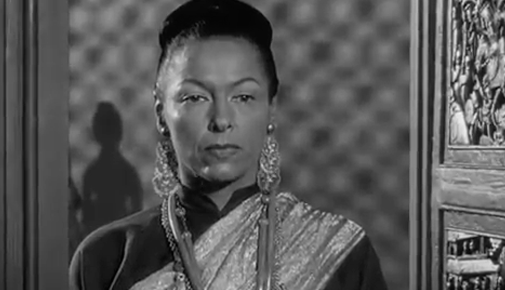
Synopsis: The once-favoured wife of the King watches and judges from a distance as she pins her dreams for her son, the Prince, on the lessons of an English schoolteacher
Stats: 49 yrs old, 30th film, Fifth billed. Second and final nomination. 12½ minutes of screentime (or 10% of the running time.)
Peter Duchan: A performance that feels tailor made for this category. The classic martyr mother AND the long-suffering, all sacrificing wife. She’s allowed some dignity and a few choice moments (she gets to tell off the protagonist—and her words change the protagonist’s arc) but the character seems built on western/American generalizations, emphasizing her grace and docility. It feels at times Sondergaard over-performs her character’s otherness as otherworldliness, avoiding eye contact with her scene partners, looking vaguely off in soft focus. ♥♥
Guy Lodge: Of the two yikes-that-happened calamities of casting in this field, Sondergaard's is the one that at least yields a performance of some emotive intuition. The role of Lady Thiang is one that would eventually become a standard trophy magnet after this stiffly earnest culture-clash drama became a perennially revived stage musical, and she sets what would become the template for the character's frustration, disappointment and fear of marginalisation with a measure of tacit restraint. But the irony of this arc being contained within the egregious artifice of being played by a white woman is insurmountable: it's a performance entirely ensnared in the film's own war between superficial good intentions and cultural cluelessness. ♥♥
Allen Nguyen: The bar for “white woman playing an Asian woman speaking in broken english” is a fairly low one, yet Sondergaard does it with more palatability than I’d have anticipated. She brings a surprisingly potent blend of warmth and tenderness to Lady Thiang, qualities that help to ground and humanize the character (which can't be said of all the other white actors playing Asian characters) while also making the jarring yellowface of it all a tiny bit more digestible. There’s much in Anna and the King of Siam to be baffled by, and Sondergaard gets points for how low she places on my list. ♥♥
Tory Devon Smith: Lady Thiang is completely wasted in a film that, in retrospect, encompasses admirable themes of compassion despite its racial offensiveness. At its core, Anna & The King of Siam are about people progressively evolving together, inspiring each other to be empathetic towards one another. When watching Flora Robson in Blackface from Saratoga Trunk, I asked myself; does the actor’s portrayal inform the audience of its character’s basic human need, or will their impression of “ethnicity” overwhelm it? Sondegaard’s repugnant delivery of Lady Thiang in a breathless agonizing tone inside a dreadful accent, didn’t give emotional significance to the words of Lady Thiang. Sondegaard seemed too concerned with an impression, therefore, she missed the opportunity to inform the audience of her character’s basic need: a mother who desperately wanted her son to be happy. The words told us, but Sondegaard’s emotional facility didn’t. I also noticed, I didn’t miss the character, or felt her presence when she wasn’t on screen. Again, if concentration was paid to Lady Thiang’s need, Sondegaard might have left an impression that was greatly needed. ♥
Nathaniel R: She was the very first Oscar winner in this category (albeit not for this) so I was curious. And I don't mean about the yellowface. But regarding that... at least she's not playing into the "exotic" trap as grotesquely as Rex Harrison is (is this the King of Siam or a fey space alien?). Though there isn't much to her performance she is affecting in her big monologue scene. In that one scene the movie hands itself over to her, while Lady Thiang stonily explains herself and all but damns Anna in the process. It's the sharpest moment in this inexplicably dull version of the oft-told fascinating story. Not that it had much competition. ♥♥
Reader Write-Ins: "The role of Lady Thiang favors any actress who plays her." - Julius (Reader average: ♥♥¼)
Actress earns 11¼ ❤s
RESULT: Anne Baxter won the Oscar, presumably with ease. At the Smackdown she triumphs again in a strangely weak field though individual panelists had different favourites. For the first time in memory, reader votes exactly aligned with the panel in terms of the rank of the performers: Baxter > Barrymore > Gish > Sondergaard > Robson.
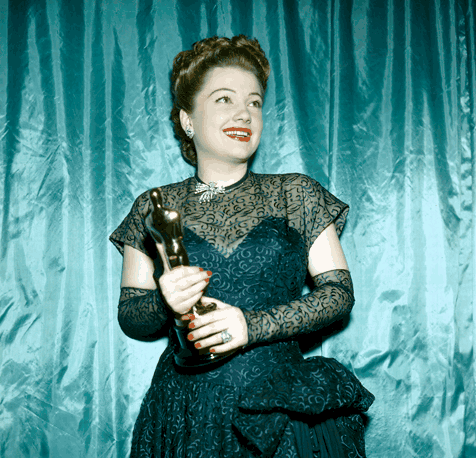
THE FULL PODCAST CONVERSATION
Download at the bottom of this post 👇 or on iTunes to hear the in-depth discussion with our marvelous guests. [All Previous Smackdowns]